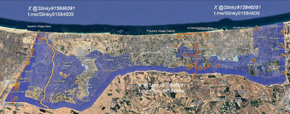Interesting developments in Gaza, but a quick note on Iran and proxies.
Iran is still dealing with assassinations against IRGC figures, insurgency, failing infrastructure and accidents, and increasing shortages of water and electricity as well as associated rise in poverty.
Assassinations and airstrikes on terror infrastructure are still very much a daily occurrence in Lebanon.
$4.7 billion worth of NASAMS equipment approved for FMS to Egypt. This marks a shift as Egypt only had access to AIM-7 for F-16s. They will operate AIM-120C-8 and AIM-9X-2. This likely also means unlocking AMRAAM for its F-16.
I believe there are 2 main reasons here:
1. Keep Egypt interested in relations with US and not seek substitution with China.
2. Equip Egypt against Houthis, as NASAMS is very relevant for that threat but not against Israel.
South Syria has calmed down significantly and despite attacks on Druze, Israel is very much interested in maintaining Syria's stability and not undermine the STG's grip.
Now onto Gaza.
The IDF, under government orders, effectively initiated a unilateral ceasefire in areas of Gaza where a maneuver has not occurred (in this war).
I recommend reading the tweet in full.
Effectively, this is the ceasefire Hamas wanted but without giving up hostages.
This is not good news for anyone. Not for Israelis, not for the hostages, not for the Palestinians. Not for western nations. Perhaps only for Hamas.
There is the option that Israel made that decision to create a more permissive ground for hostage rescue ops. But I will intentionally exclude any covert operations and activities just in case, to give the pessimistic view.
It is my personal belief that the Israeli government has been dragging its feet, failing to implement necessary reforms, clashing with its military leadership, and as a result taking a lot of half baked measures and too late.
The 2 primary goals of the war are to remove Gaza's capability to threaten Israel, and to create conditions for the hostages' return.
Neither was achieved.
Another silent objective is to end the war ASAP. It takes a toll - in lives, families, and treasure.
Ideally every war would occur quickly and decisively but the conditions in Gaza are less permissive for that. It doesn't mean it can't be done much better.
I also believe Netanyahu is frequently caving to pressure primarily from the US. Both Dem and Rep policies are misguided. The former because they create conditions to start new wars, and the latter because they think wars should end quickly but not decisively.
Since the beginning of the war, Israel had 2 options regarding the humanitarian aspect:
- Let the UN run things and disengage completely from the process.
- No water, food, electricity entering. Nothing.
- All these things provided by the UN in whatever way they choose.
- Easier and cheaper to implement but Hamas gets the financial means to survive.
- Block the UN and handle things independently.
- Only GHF or equivalent operating in Gaza.
- Sufficient reach to completely replace UN.
- Expensive and tiring but chokes Hamas's funds.
Thing is, if you do both, you get the worst of both worlds. You put in the effort - in treasure, fatigue, and lives, and Hamas still get their financial lifeline.
And either way, the decision on either mechanism should have been made sometimes before November of 2023. It's an absolute disaster we waited until 2025 for that.
In related news:
Israel, USA, and mediators, have accused Hamas of backing out of the negotiations.
I mean, why wouldn't they? International pressure is working and Israel allows the UN to keep getting aid in despite GHF being active for months. France as usual surrendered and announced they'll recognize a Palestinian state. Israel will not maneuver in areas where hostages are held so they have immunity there, and here they got their ceasefire without making any concessions.
The goal should be very clear:
- End the war ASAP.
- Create conditions for reduction of Gazan threat.
- Create conditions for naturally increasing pressure on Hamas.
How to do that? With any of the proposals I raised earlier.
Examples:
- Occupy and annex perimeter and north Gaza. Occupy the remaining red area (in tweet).
- Goals:
- Permanent threat reduction.
- Aspect of permanence in deterrence.
- Increased strategic depth.
- Reduction of Hamas's autonomy and power.
- Caveat: Retain the Gaza-Egypt border as a negotiation tool. Land for hostages.
- Arm and bring proxies into reduced Hamas-controlled area.
- Goals:
- Create conditions for struggle over hostages.
- Proxies could sell hostages back to Israel = not sacrificing security for them.
- Truly clear Gaza off Hamas.
- No lives risked for this op.
- Mass aid overflow.
- Goals:
- Break up Hamas's food black market.
- Use looting as opportunity to hit Hamas.
- Siege on Gaza (notice not all examples are to be implemented simultaneously).
- Goals:
- Aid for hostages scheme.
- Internal pressure on Hamas.
- Uprisings could flush out Hamas tunnels.
The point of these examples isn't to push for a solution nor to suggest which is better or not, but to demonstrate that action is possible, but Israel actively chooses inaction, characteristic of Netanyahu's entire political career.





